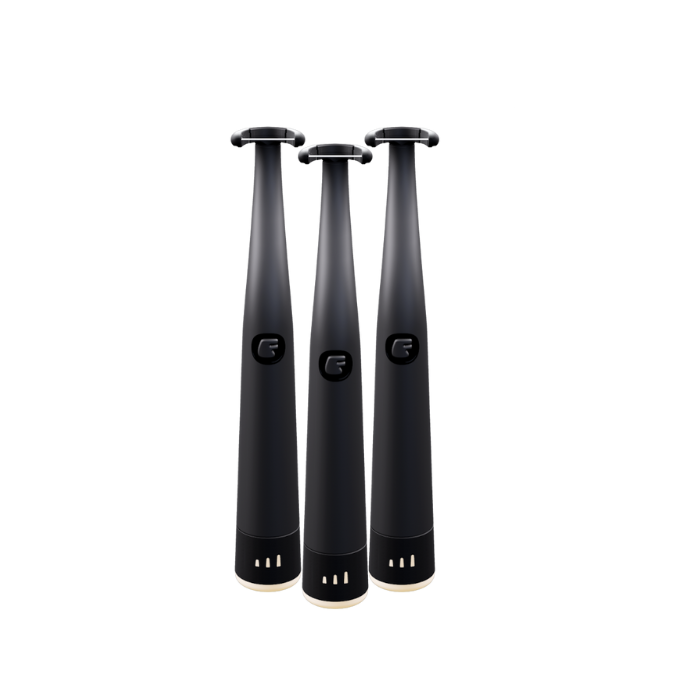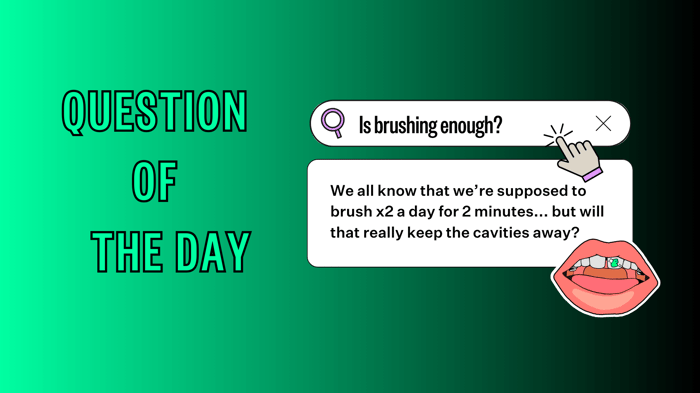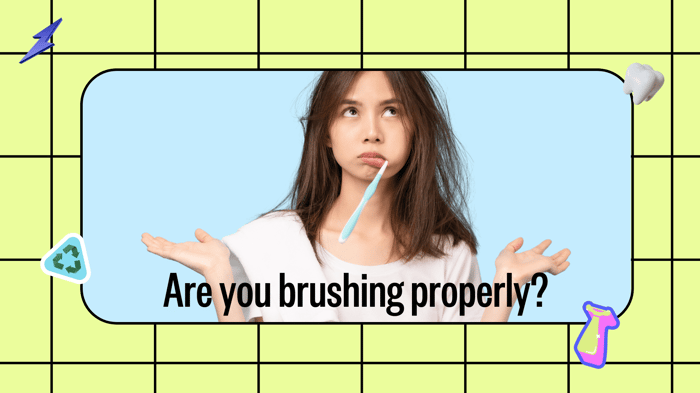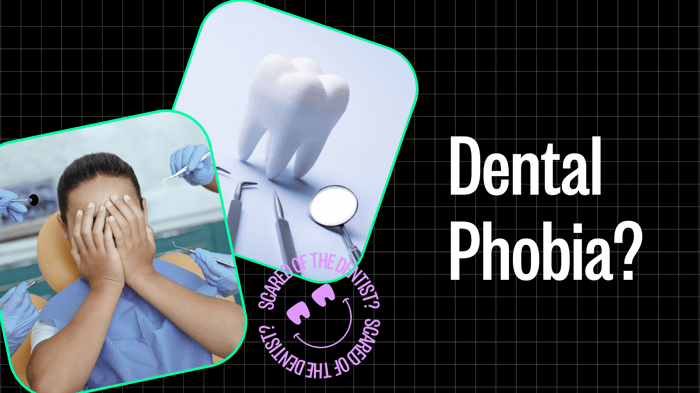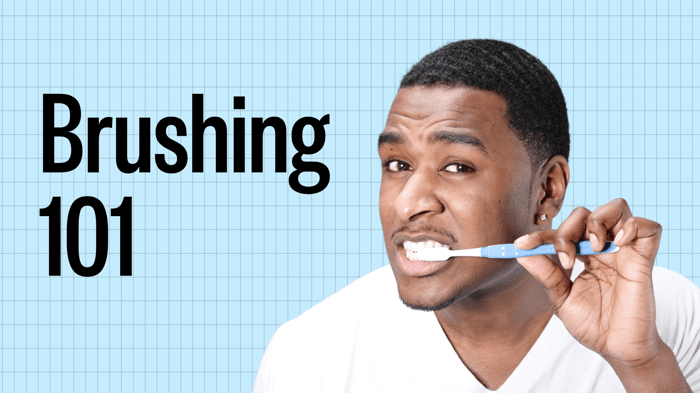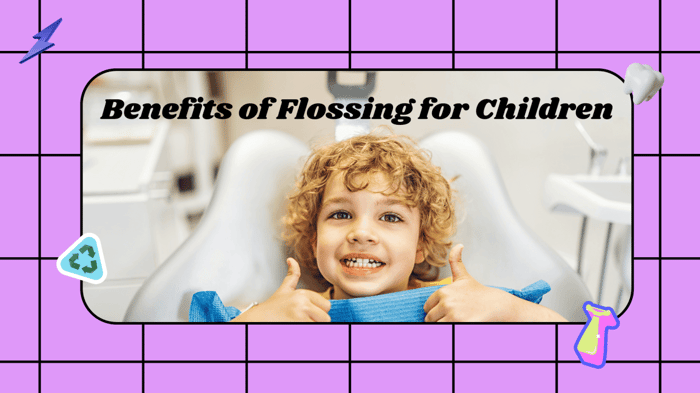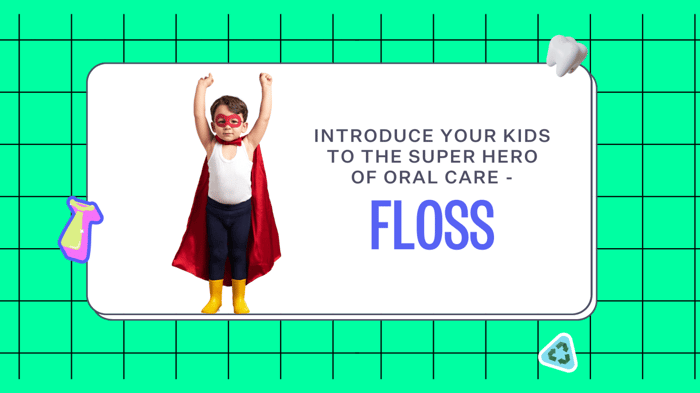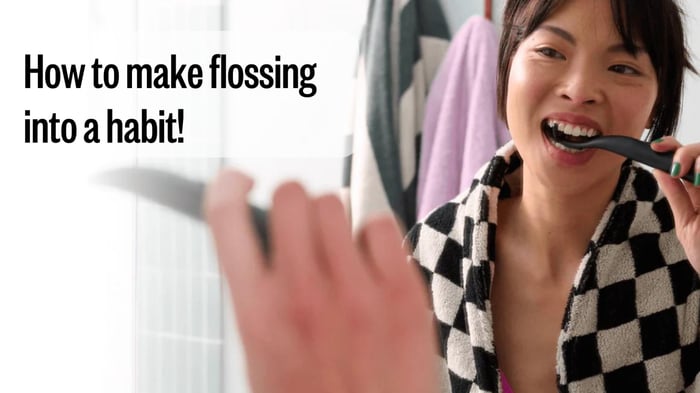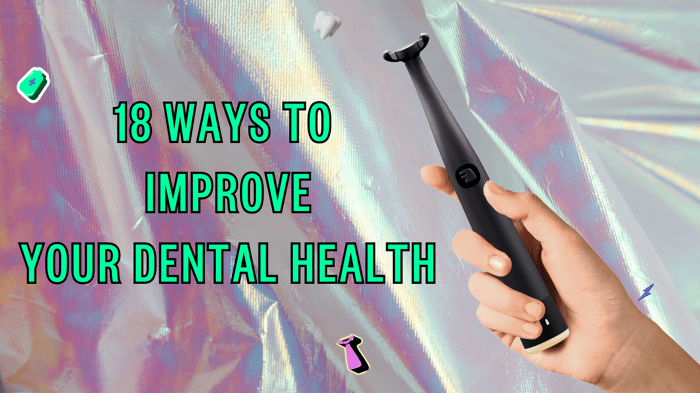Most people will agree that brushing your teeth well is a vital step in keeping your mouth healthy. It helps to wipe away food bits and harmful plaque that can hurt your teeth and gums. But is brushing teeth enough? Simply scrubbing your pearly whites does not cover every aspect of oral care - and if brushing is the only oral hygiene in your daily routine - 40% of your teeth aren't getting clean! That's right brushing only cleans 60% of the tooth. Extra care steps round out a complete dental health routine - let's delve deeper and discuss a well-rounded oral care routine.
While brushing your teeth is essential, it is not enough on its own to maintain optimal oral hygiene. It's important to also incorporate daily flossing, like with Flaus Electric Flosser into your dental care routine, alongside regular visits to the dentist for checkups and professional treatments.

Is Brushing Teeth Enough?
You may have heard repeatedly that brushing your teeth twice a day is the cornerstone of optimal oral hygiene. However, does it ensure that every nook and cranny in your mouth is receiving the necessary care?
Brushing your teeth twice a day for two minutes each time is indeed a good starting point. This routine serves as an essential foundation in maintaining oral health by removing plaque, food particles, and bacteria that cause tooth decay and gum disease, but it may not be sufficient for everyone. For example, those with braces, bridges, or other orthodontic appliances may need to brush more frequently to prevent food from getting stuck and causing decay underneath the appliances.
It's crucial to consider the quality of your brushing technique as well. Haphazardly running a toothbrush over your teeth for two minutes might not effectively remove plaque or address hard-to-reach areas. A conscious effort to thoroughly clean every surface of your teeth—front, back, and chewing surfaces—ensures comprehensive removal of debris and bacteria.
In light of this, regularly evaluating your brushing routine and making adjustments as necessary is pivotal. Utilizing fluoride toothpaste, incorporating interdental cleaning tools like floss (or, in our world, Flaus) or interdental brushes, and adopting techniques recommended by dental professionals can further enhance the effectiveness of your routine.
By reevaluating and fine-tuning your brushing habits to suit your unique dental needs, you can optimize your oral hygiene routine with precision and care.
Consequences of Recommended vs Neglected Brushing Habits
Let's delve into what can happen if we don't brush our teeth as often as recommended. Neglecting proper oral care can lead to the formation of plaque and tartar. Plaque, a sticky film filled with bacteria, forms on your teeth, while tartar develops when plaque hardens. When these substances build up, they can result in cavities, gum disease, and bad breath. Additionally, skipping regular brushing can also cause tooth decay as food particles left on the teeth contribute to acid production by bacteria, resulting in damage to tooth enamel over time.
For instance, imagine going days without taking a shower – you'd start to smell pretty quickly. The same goes for your mouth; without proper and consistent cleaning, bacteria accumulate and multiply, leading to unpleasant breath. The consequences of neglected brushing habits don't stop there. Gum disease is another potential outcome, occurring when the gums become swollen or infected due to the buildup of plaque along and under the gum line. If not addressed early, it can progress to more severe stages, causing the gums to pull away from the teeth and ultimately result in tooth loss.
On the opposite end of the spectrum, adhering to the recommended brushing routine not only prevents these issues but also contributes to overall oral health and well-being. By consistently removing plaque through brushing and flossing, one significantly reduces the likelihood of developing cavities, gum disease, bad breath, and tooth decay.
It's like giving your teeth a protective shield against these problems! So, let's make it a habit to brush at least twice a day and show some love to those pearly whites.
Going forward, it becomes evident that brushing alone may not be sufficient for optimal oral hygiene. Now let's unpack the unsung hero, floss' role in dental hygiene.
The Underscored Role of Flossing in Dental Hygiene

Using the Flaus electric flosser can significantly enhance your oral hygiene routine by providing a thorough and efficient way to clean between your teeth. Its advanced technology helps to remove plaque and debris that traditional flossing might miss, reducing the risk of gum disease and cavities. Regular use of the Flaus electric flosser helps ensure that your teeth and gums stay healthy, leading to a brighter smile and fresher breath. For optimal results, incorporate it into your daily dental care regimen along with brushing and regular dental check-ups.
Flossing, often overshadowed by the toothbrush, plays an equally pivotal role in maintaining good oral hygiene. While toothbrushes are effective at cleaning the visible surfaces of our teeth, they are unable to reach between the teeth and along the gum line as effectively as dental floss can. Proper dental care involves more than just scrubbing the front and back of our teeth; it requires a comprehensive approach to cleanliness that encompasses all parts of our teeth.
The spaces between our teeth and below the gumline are comfortable hiding spots for food particles and plaque to accumulate. If left unchecked, these hidden pockets can become ideal breeding grounds for bacteria, paving the way for gum disease, cavities, and even persistent bad breath. To tackle this issue effectively, flossing is essential. It swoops into the spaces between our teeth, dislodging those pesky food bits and sticky plaque before they manage to create problems. When practiced consistently alongside regular brushing, flossing becomes an invaluable complement to keep your dental health in top shape.
Indeed, studies have shown that subjects who floss daily have a significantly lower risk of developing gum disease and cavities compared to those who only brush their teeth. This underscores the significance of integrating flossing into our daily oral care routine.
Imagine a scenario where you're sprucing up a room by dusting every visible surface but neglect to clean underneath furniture or in between crevices. Over time, those overlooked areas become unkempt and collect dust, diminishing the overall cleanliness. Similarly, not utilizing dental floss along with brushing could allow harmful substances to linger in hard-to-reach areas within our mouths.
The Role of Mouthwash for a Wholesome Oral Regime
Mouthwash is a helpful addition to your oral care routine, reaching areas in your mouth that brushing and flossing can't and killing bacteria that cause bad breath and gum disease. Although mouthwash provides many benefits, it should complement, not replace, your regular brushing and flossing routine.
Key Types of Mouthwash:
| Type | Features |
|---|---|
| Antiseptic | Contains alcohol and effectively kills germs and freshens breath but may cause dryness with long-term use. |
| Fluoride | Fights cavities by strengthening tooth enamel—useful for those prone to cavities or with weakened enamel. |
| Natural | Made from natural ingredients like essential oils offer gentler alternative for individuals with sensitivity to alcohol-based products. |
Additionally, there are different types of mouthwash available, tailored to specific oral health needs. For example, there are mouthwashes designed to freshen breath, reduce plaque buildup, whiten teeth, or provide additional fluoride for cavity protection.
When incorporating mouthwash into your daily oral care regimen, timing is crucial. Many prefer using mouthwash after brushing and flossing to capture any remaining bacteria missed during previous steps. However, brushing your teeth should be the last step of your oral care routine. You want the ingredients in toothpaste to be on your teeth as long as possible - so it's also advised that you don't rinse after brushing. An optimal oral care routine follows the below cadence:
1. Floss (or, as we'd like to say, Flaus!)
2. Mouthwash
3. Brush
A quick swish of mouthwash can add an extra layer of protection to your oral health routine. Remember to choose a mouthwash that addresses your specific oral care needs and incorporate it into your routine after brushing and flossing for optimal freshness and protection against oral health issues.
Value of Regular Dental Cleanings: Is Brushing Teeth Enough?
You might wonder if brushing and flossing are enough to keep your mouth healthy. Even with the best dental routine at home, there are still areas that are difficult to reach and clean thoroughly. This is where regular dental checkups can make a significant difference in your oral health.
When you visit your dentist every six months, they do more than just check for cavities; they also conduct a comprehensive examination of your entire mouth, including looking for signs of gum disease, oral cancer, and other potential issues that you might not notice on your own.
During these appointments, dental professionals will eliminate plaque and tartar buildup, which can be hard to remove completely with regular brushing and flossing alone, so having them removed by a professional is crucial for maintaining healthy teeth and gums.
Additionally, it’s an opportunity to discuss any concerns you might have about your teeth or gums. Your dentist can offer personalized recommendations based on their assessment of your oral health and hygiene habits. For example, they might advise techniques or tools tailored to your specific needs, such as using a different toothbrush or suggesting specialized mouthwashes or fluoride treatments. By receiving this guidance from a professional, you can maximize your efforts in maintaining optimal oral hygiene.
Research consistently shows that individuals who attend regular dental cleanings have significantly lower rates of dental issues like cavities, gum disease, and other potential oral health challenges compared to those who only rely on at-home maintenance.
So, while daily brushing and flossing are essential components of good oral hygiene, regular dental cleanings play an equally vital role in preventing infection, decay, and other oral health challenges. It's an investment in your long-term oral health that shouldn't be overlooked.
Maintaining optimal oral hygiene goes beyond just regular dental cleanings. Let's now explore comprehensive practices for achieving overall oral health.
Comprehensive Practices for Optimal Oral Hygiene Is Brushing Teeth
When it comes to tending to your teeth and gums, it's not merely about brushing, flossing, and using mouthwash. Much like nurturing a garden goes beyond watering the plants, maintaining optimal oral hygiene involves considering various factors impacting overall dental health. Let's delve into some crucial practices for comprehensive oral care.
The Role of Diet
Maintaining healthy teeth and gums commences with what you eat. A balanced diet abundant in fruits, vegetables, whole grains, lean proteins, and dairy products imparts essential nutrients to support good oral health. Calcium is vital for robust teeth and bones, while vitamin C reinforces healthy gums. Moreover, crunchy fruits and vegetables such as apples and carrots can assist in cleaning plaque from teeth and freshening breath. Conversely, curtailing sugary snacks and beverages that contribute to tooth decay is equally significant for preserving healthy teeth.
Staying Hydrated
Believe it or not, drinking water does more than just keep you hydrated; it also plays a role in maintaining good oral health. Water aids in rinsing away food particles and sustaining adequate saliva levels—crucial for combating bacteria. Saliva serves as a natural defense mechanism against tooth decay by washing away residual food and neutralizing acids produced by bacteria in the mouth.
Ditching Tobacco Products
Tobacco products wreak havoc on oral health in myriad ways. Apart from staining teeth and causing bad breath, they escalate the risk of gum disease, tooth loss, and in severe instances, oral cancer. Encouraging individuals to avoid or quit smoking will not only benefit their overall health but also considerably enhance their oral health.
Holistic Care Approach
It's imperative to offer comprehensive guidance on maintaining good oral health by underscoring the interconnected aspects of holistic oral care. This encompasses educating individuals about the significance of routine dental check-ups for preventive care and early detection of potential issues. Furthermore, advocating the combination of at-home dental hygiene practices with professional treatments enhances overall oral health and constitutes a proactive measure in preventing infection, tooth decay, and other oral health issues.
By incorporating these comprehensive practices into daily routines, individuals can holistically take charge of their oral health, benefiting not only their teeth and gums but also their overall well-being.
As we navigate the intricate landscape of oral care, understanding how to fortify our teeth against harmful invaders is paramount. Let's now explore how to ward off infections—a crucial strategy in ensuring the long-term well-being of your precious pearly whites.
Warding Off Infections: A Defense Strategy for Your Teeth
Your teeth are your first line of defense in the battle for overall health, and ensuring they stay strong and disease-free is crucial. It all begins with a robust dental care routine that combines regular brushing, flossing, mouthwash use, and consistent checkups with your dental professional. But what more can we do to fortify our teeth against unwanted invaders?
One key element to consider involves what we put into our bodies. A diet rich in sugary treats or acidic drinks can pave the way for harmful bacteria to thrive in your mouth. While an occasional treat is certainly acceptable, it's important to be mindful of how often we indulge in these types of foods and drinks. Bacteria feast on sugar, which, if left unchecked, can lead to tooth decay and gum disease.
Furthermore, certain lifestyle habits can either bolster or undermine our oral health defense strategy. For example, smoking not only stains teeth but also contributes to a host of dental issues including gum disease and oral cancer.
In addition to maintaining good oral hygiene practices, it's essential to be aware of preventive measures against common dental issues. These include using a straw when drinking acidic beverages to minimize contact with your teeth, rinsing your mouth with water after consuming sugary treats, and incorporating a diet abundant in fruits and vegetables to promote overall dental wellness.
Regular visits to the dentist play a significant role in identifying any potential issues early on, adding another layer of protection against infections and other oral health concerns. Routine checkups allow dentists to detect early signs of problems like cavities, gum disease, or even oral cancer. This provides an opportunity to address any issues before they escalate into larger-scale problems.
Just like getting regular car maintenance where small issues can be addressed before they cause catastrophic failures. When it comes to our teeth, it's far better—both for our well-being and our wallets—to catch problems early on.
Remember, proactive care today leads to better oral health tomorrow. Take charge of your dental wellbeing by adopting these preventive strategies.
How often should I brush my teeth to ensure proper dental care?
The recommended frequency for brushing teeth to ensure proper dental care is at least twice a day. Brushing in the morning and before bed helps remove plaque and bacteria, preventing tooth decay and gum disease. Studies have shown that individuals who brush their teeth fewer than two times a day are at a higher risk of experiencing dental issues like cavities and gingivitis. So make it a habit to brush twice daily for optimal oral hygiene!
Are there any potential consequences of relying solely on brushing teeth?
Yes, relying solely on brushing teeth may have potential consequences for optimal oral hygiene. While brushing is crucial, it cannot reach every crevice and gap between teeth or remove all plaque buildup. Neglecting other essential oral hygiene practices, such as flossing and using mouthwash, can lead to an increased risk of cavities, gum disease, and bad breath. According to the American Dental Association, only 16% of individuals effectively clean between their teeth daily, emphasizing the importance of a comprehensive oral care routine beyond brushing alone.
What other practices can complement brushing teeth for optimal oral health?
Alongside brushing teeth, incorporating flossing into a daily oral hygiene routine is crucial for optimal oral health. Flossing helps remove plaque and food particles from between teeth and along the gumline, where toothbrushes cannot reach effectively. According to the American Dental Association, only 16% of Americans floss daily, emphasizing the need to promote this practice as an essential complement to brushing. Additionally, using mouthwash after brushing and flossing can help kill bacteria and freshen breath. A study published in the Journal of Clinical Periodontology found that combining mouthwash with regular brushing reduced gingivitis by 36% compared to brushing alone.
Can certain individuals, such as children or those with specific dental conditions, benefit from additional dental care beyond brushing teeth?
Yes, certain individuals, such as children and those with specific dental conditions, can benefit from additional dental care beyond brushing teeth. For children, regular visits to a pediatric dentist for professional cleanings and preventive treatments can help ensure optimal oral health. Similarly, individuals with conditions like gum disease or weakened enamel may require specialized treatments such as deep cleanings or fluoride applications to maintain their oral hygiene. According to the CDC, nearly 47.2% of adults in the United States have some form of periodontal disease, highlighting the need for additional dental care beyond brushing alone.
Is there scientific evidence supporting the claim that brushing teeth alone is sufficient for maintaining good oral hygiene?
No, there is scientific evidence that brushing teeth alone is not sufficient for maintaining good oral hygiene. While brushing is important, it only removes about 60% of plaque buildup, leaving a significant amount behind. A study published in the Journal of Periodontology found that regular flossing alongside brushing reduced gum bleeding by 38% compared to brushing alone.








